Core i7-8700K Review: Coffee Lake Brews A Great Gaming CPU
Why you can trust Tom's Hardware
Conclusion
AMD’s competitive architecture, disruptive pricing, and class-leading core counts continues to turn heads. Intel responded to the Threadripper family by introducing Skylake-X-based CPUs for less money per core than we've ever seen before. Up until now, though, it showed no interest in affecting that metric with its mainstream desktop chips. This changes with Coffee Lake, which employs the same underlying architecture as Kaby Lake, but adds execution cores and cache. Improved Turbo Boost bins also help maintain performance in lightly-threaded tasks.
Intel says that its Core i7-8700K is the company's best gaming processor ever. So, we use a geometric mean of 99th percentile frame times, a good indicator of smoothness, converted into an FPS measurement, to gauge the veracity of this bold claim across our suite. Five of the games we test were released in 2016, and five are older (2014/2015). Extra cores could enable more performance as software evolves, so we also include a chart with newer games that thoroughly utilize available host processing resources. We also have price-to-performance charts that get split up to include both the price of the processor and extra platform costs. For the models that don't come with a bundled cooler, we add an extra $25 for a basic heat sink. We also add $20 if overclocking requires a more expensive motherboard (as is the case for Z370).
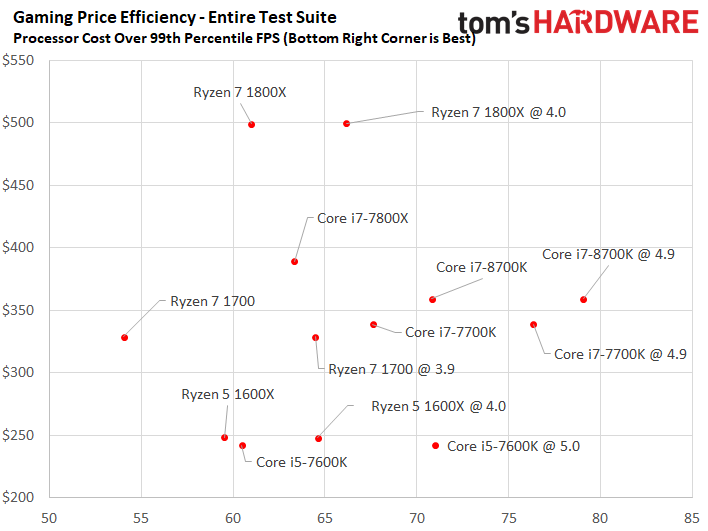
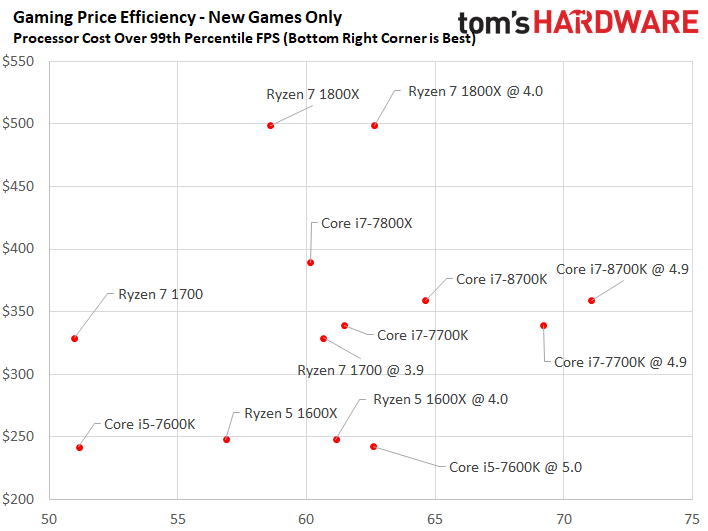
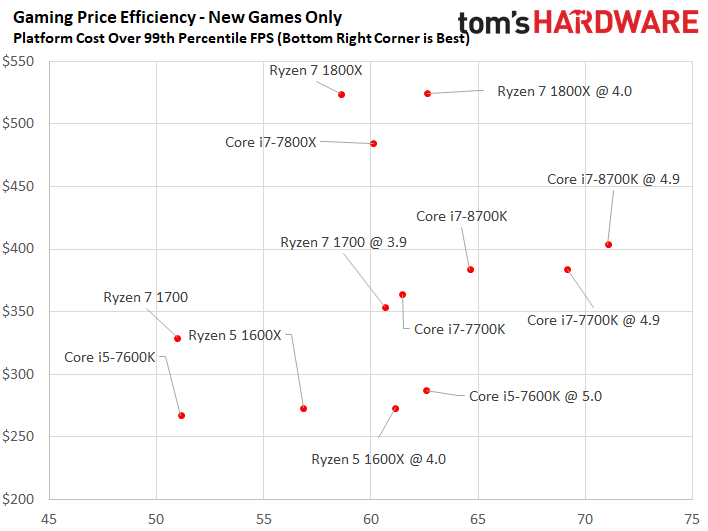
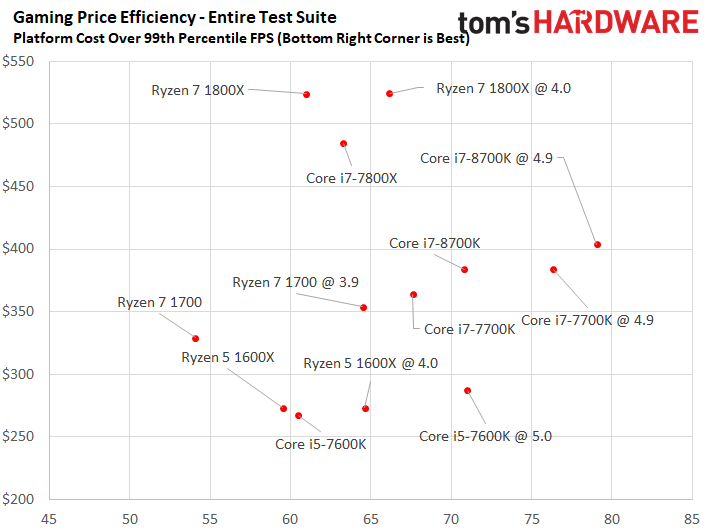
Despite a few missteps, Core i7-8700K lives up to Intel’s claims. While it doesn't beat the -7700K by a massive margin, the Coffee Lake flagship does deliver better performance in stock and overclocked form. Of course, adding a Z370 motherboard and competent cooler knocks you over the $400 mark, so be ready to pay for that privilege.
Value-seekers have to be asking if Core i7-8700K's price tag is even worth paying, then. After all, you can get Ryzen 7 1800X-class performance out of an overclocked Ryzen 7 1700 for $300 or less. But based on our matrix, Coffee Lake gives you the best performance (furthest to the right) without getting too crazy on price. We're naturally wondering how Core i5-8600K will fare. For now, though, Core i7-8700K is the gaming CPU to own.
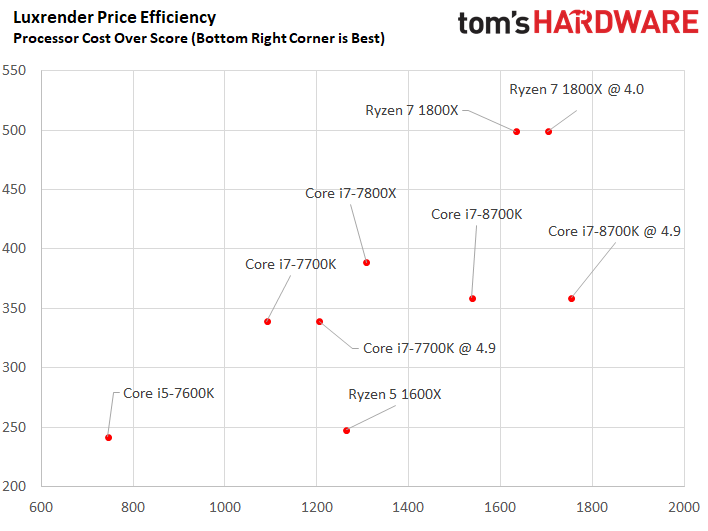
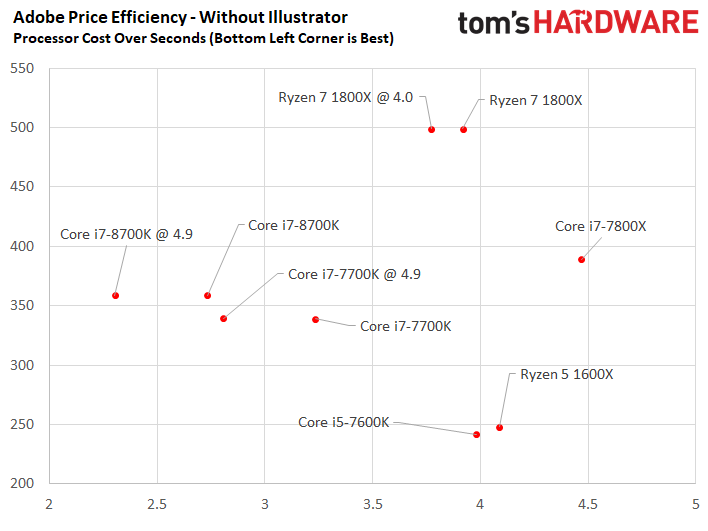
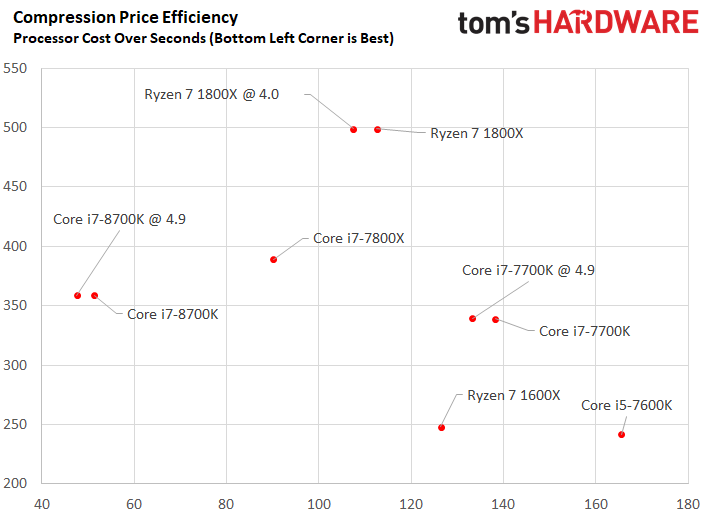
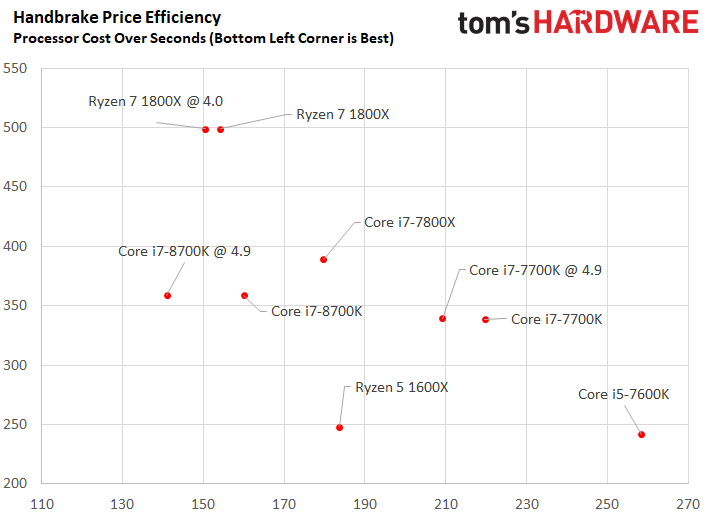
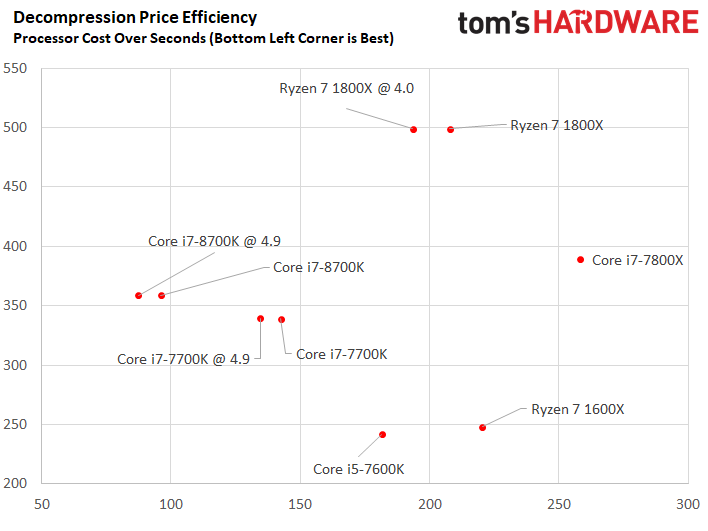
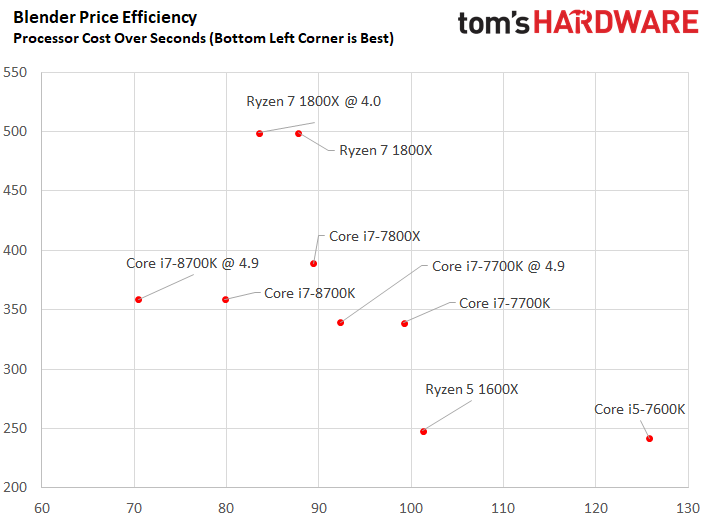
Whereas Kaby Lake tends to fall behind Ryzen once we jump out of the games and start looking at rendering/encoding workloads, Coffee Lake's extra cores, higher clock rates, and overclocking headroom help close that gap. Applications previously notorious for going AMD's way are now more hotly contested.
Unfortunately, you will have to buy a new Z370-based motherboard to support Core i7-8700K. Coffee Lake necessarily breaks compatibility with the not-altogether-old Z270 chipset for higher memory data rates and improved power to the CPU's package. And of course, the Z-series platform controller hub is a requisite if you want access to unlocked ratio multipliers. Lower-end B- and H-series chipsets are coming, but not until next year.
We're also disappointed that Core i7-8700K still utilizes thermal paste between its die and heat spreader. Whereas this was a significant issue during our Skylake-X evaluation, though, it's not as problematic on a 95W CPU. You can easily stave off throttling with a heat sink and fan, or dial in a respectable overclock under a closed-loop liquid cooler.
Get Tom's Hardware's best news and in-depth reviews, straight to your inbox.
Intel has its 10nm Cannon Lake processors coming in the second half of 2018, and AMD has a Ryzen refresh cycle coming next year. Knowing this, should you upgrade now or wait for the next wave of hardware? Due to the iterative nature of most updates, we rarely recommend jumping forward one, or even two generations. However, if you routinely find yourself running productivity workloads that might be served well by Core i7-8700K's extra cores, we could see replacing a quad-core chip with six cores. Gamers interested in maximum performance or streaming also stand to benefit, though in a world of single-GPU graphics configurations, you'd be hard-pressed to bottleneck an overclocked -7700K with even a GeForce GTX 1080 Ti (particularly at the high resolutions it's meant to drive).
It's an exciting year to be an enthusiast. Intel obviously planned to beef up its line-up years back, but we can thank AMD for the accelerated timeline and competitive pricing. Competition truly is a wonderful thing.
MORE: Best CPUs
MORE: Intel & AMD Processor Hierarchy
MORE: All CPUs Content

Paul Alcorn is the Editor-in-Chief for Tom's Hardware US. He also writes news and reviews on CPUs, storage, and enterprise hardware.
-
cknobman Looks like it might be time for AMD to lower prices.Reply
AMD really has shaken Intel up, never would I have dreamed (before this year) I'd see Intels best gaming cpu (especially a K model) release at $360. -
AgentLozen AMD's price per core is still very strong. It struggles in gaming at 1080p but Tomshardware didn't provide data in 1440p or 4K.Reply
I'm not yet convinced that AMD is in trouble. -
saunupe1911 Hmmm is it worth a skylake 6700K that's stable at 4.6 Overclock to upgrade? Probably not. I wouldn't mind 6 cores though. I wonder how many will hit 5.0!Reply -
jroc188 8700k is $480ca got the R5 1600 for $255ca and mobo for $120ca. $375 all together and more then happy with the gaming results. But the 8700k dose look sweet on the benchmarks. AMD with a price drop will still sell wellReply -
shrapnel_indie ReplyOf course, while Intel's accelerated Coffee Lake-S launch makes it look today's unveiling is a direct response to heated competition, in reality, the long incubation period for new processors means it’s more likely the result of 10nm manufacturing delays.
Ummm... Yeah, the design may have been kicking around, and ready to go before Ryzen, but when it is released months earlier than scheduled.... Saying that it wasn't a response to Ryzen seems more like misinformation more than pure fact. Yeah, I don't doubt 10nm manufacturing delays played a part in the previous release date, but Ryzen forced its release a little earlier than planned. -
bloodroses To AMD fanbois who claimed that Intel was toast and couldn't respond to Ryzen's release, here's Intel's Mic drop. *thud*Reply
For the rest of us consumers, this is great news for continued strong competition at reduced prices from both companies. :) -
massacre.h4te Nearly 90 degrees Celsius when overclocked gaming on an AiO. Prettttttty toasty!Reply -
saunupe1911 Reply20241606 said:To AMD fanbois who claimed that Intel was toast and couldn't respond to Ryzen's release, here's Intel's Mic drop. *thud*
For the rest of us consumers, this is great news for continued strong competition at reduced prices from both companies. :)
Z370 motherboards are expensive though...sheesh. And you gotta reach out to liquid cooling companies for attachments for mounting to this socket. Canon Lake may be out before you can get everything situated for a nice 8700k upgrade lmao. -
FormatC Reply
The reason is simple:20241615 said:Nearly 90 degrees Celsius when overclocked gaming on an AiO. Prettttttty toasty!
The built-in frying fat between IHS and die :) -
LilDog1291 Reply20241606 said:To AMD fanbois who claimed that Intel was toast and couldn't respond to Ryzen's release, here's Intel's Mic drop. *thud*
For the rest of us consumers, this is great news for continued strong competition at reduced prices from both companies. :)
I don't know if I would call 90C+ on a chiller cooler (granted its a high overclock but the 7700k had the same problem) a mic drop but it is definitely a step in the right direction. If they can get their temperatures under control in the next generation they will win my vote back.